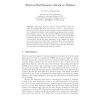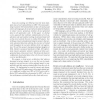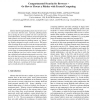24 search results - page 1 / 5 » Trust on Web Browser: Attack vs. Defense |
ACNS
2003
Springer
13 years 10 months ago
2003
Springer
This paper proposes a browser spoofing attack which can break the weakest link from the server to user, i.e., man-computerinterface, and hence defeat the whole security system of ...
NDSS
2009
IEEE
13 years 11 months ago
2009
IEEE
Cross-site scripting (or XSS) has been the most dominant class of web vulnerabilities in 2007. The main underlying reason for XSS vulnerabilities is that web markup and client-sid...
CCS
2010
ACM
13 years 5 months ago
2010
ACM
Cross-origin CSS attacks use style sheet import to steal confidential information from a victim website, hijacking a user's existing authenticated session; existing XSS defen...
TOIT
2008
13 years 4 months ago
2008
In spite of the use of standard web security measures (SSL/TLS), users enter sensitive information such as passwords into scam web sites. Such scam sites cause substantial damages...
IEEEARES
2007
IEEE
13 years 11 months ago
2007
IEEE
Identity theft through phishing attacks has become a major concern for Internet users. Typically, phishing attacks aim at luring the user to a faked web site to disclose personal ...



